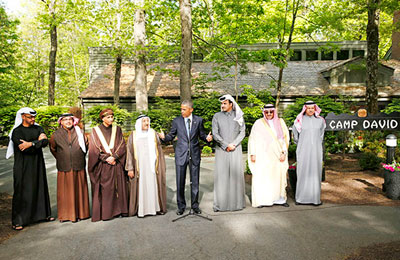
Obama vows to 'stand by' Gulf allies amid Iran concerns
CAMP DAVID, May 15, 2015
President Barack Obama vowed on Thursday to back Gulf allies against any ‘external attack,’ seeking to reassure them of Washington's iron-clad commitment to their security amid Arab anxiety over US-led efforts to reach a nuclear deal with Iran.
Hosting the six-nation Gulf Cooperation Council for a rare summit at Camp David, Obama pledged that the United States would consider using military force to defend them and would also help counter Iran's ‘destabilising activities in the region.’
"I am reaffirming our iron-clad commitment to the security of our Gulf partners," Obama told a closing news conference at the presidential retreat outside Washington.
Obama stopped short of offering a formal defense treaty that some Gulf countries had sought. Instead he announced more modest measures, including integrating ballistic missile defense systems, beefing up cyber and maritime security, streamlining weapons sales and increasing joint military exercises.
The United States and five other world powers are seeking to reach a final deal with Iran on curbing its nuclear programme by a June 30 deadline. The GCC agreed in a joint communique that a "comprehensive, verifiable" accord with Tehran would be in their security interests.
But Obama did not go as far as saying the Sunni Arab states had committed to backing the outcome of the talks with Iran, their Shi'ite arch-rival. The Saudi foreign minister made clear, in fact, that his government was withholding judgment for now.
Obama also sought to allay Gulf Arab concerns that the potential lifting of international sanctions on Tehran would embolden it to fuel more sectarian strife in the region.
Differences over US policy toward Tehran, Syria's civil war and the Arab Spring uprisings loomed over the meetings, which were already clouded by the absence of most of the Gulf's ruling monarchs, who instead sent lower-level officials.
Saudi King Salman pulled out, sending Crown Prince Mohammed bin Nayef and Deputy Crown Prince Mohammed bin Salman in his place in a move widely interpreted as a snub that reflected Gulf frustration with the Obama administration. The White House insisted that such decisions were not intended as slights.
OBAMA'S BALANCING ACT
The GCC consists of Saudi Arabia, Kuwait, Qatar, Bahrain, the United Arab Emirates and Oman. Obama sought to strike a balance between trying to ease their fears about his diplomacy with Iran and squeezing the oil-rich states to work together more in their own defense.
"The United States will stand by our GCC partners against external attack," Obama said, with Gulf leaders by his side.
But he then told a news conference it was a "two-way street" and Gulf countries, which have differences among themselves, must also cooperate better. A summit joint statement showed the GCC states committing to develop a US-assisted region-wide missile defense system, something Washington has long advocated.
However, it was unclear whether Obama had made significant headway toward Gulf Arab backing for an emerging Iran deal. The White House had hoped at least for a toning-down of any criticism. That could help convince a skeptical US Congress of broad backing in the region, where US ally Israel stands as the most vocal opponent of Obama's diplomatic effort.
Israel, widely believed to be the Middle East's only nuclear-armed state, has so far offered no overt criticism of the proposed strengthening of Gulf Arab defenses, suggesting that it is open to anything that challenges Iran's power in the region.
Gulf states, in the final communique, stopped short of endorsing a framework deal reached last month that envisages sanctions relief in return for curbs on Tehran's nuclear programme. The agreement aims to prevent Iran from developing an atomic weapon, although Tehran has long maintained its nuclear programme is purely for peaceful use.
Saudi Foreign Minister Adel Al-Jubeir said his country favors efforts to negotiate the closing of Iran's nuclear weapons pathways, but told reporters: "We will follow the talks and see before we can judge."
The White House said it does not want to see a nuclear arms race in the Middle East. Some Saudi officials have hinted at pursuing the kingdom's own nuclear technology if any final deal leaves Iran with too much leeway to develop a weapon.
Gulf leaders are concerned that lifting sanctions would allow Tehran to increase funding for Shi'ite militias in volatile countries such as Syria, Yemen, Iraq and Lebanon.
The Saudis and other Gulf states have also been accused of fuelling sectarian proxy wars involving their neighbours.
Obama seemed at one point to play down any non-nuclear threat from Iran. But he said Gulf states needed to shore up their defenses, including security for the world's most important oil routes.
Iranian naval vessels fired warning shots over a Singapore-flagged vessel in international waters in the Gulf on Thursday, prompting the oil products tanker to flee to UAE waters, according to US officials. - Reuters







